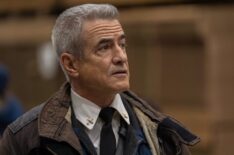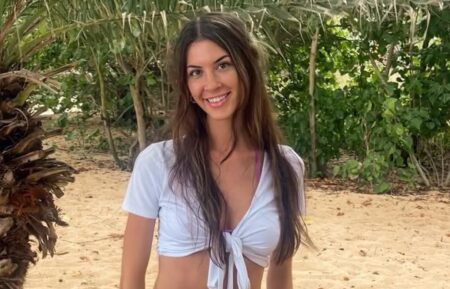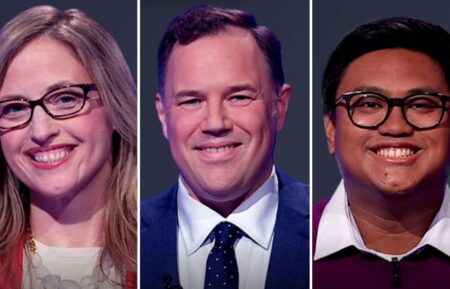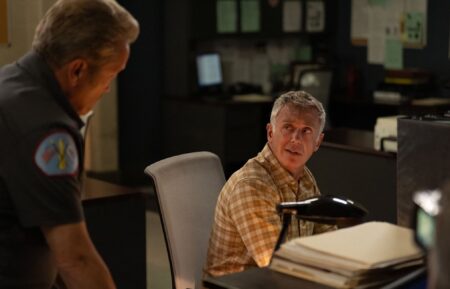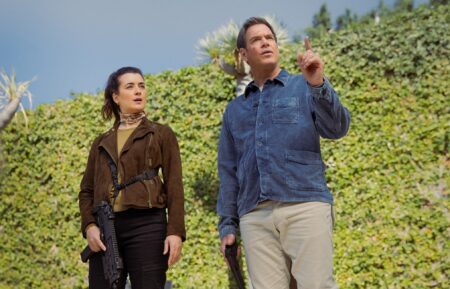Yuriy Sardarov Unpacks ‘Daddy’ Film & That Shocking ‘Chicago Fire’ Death
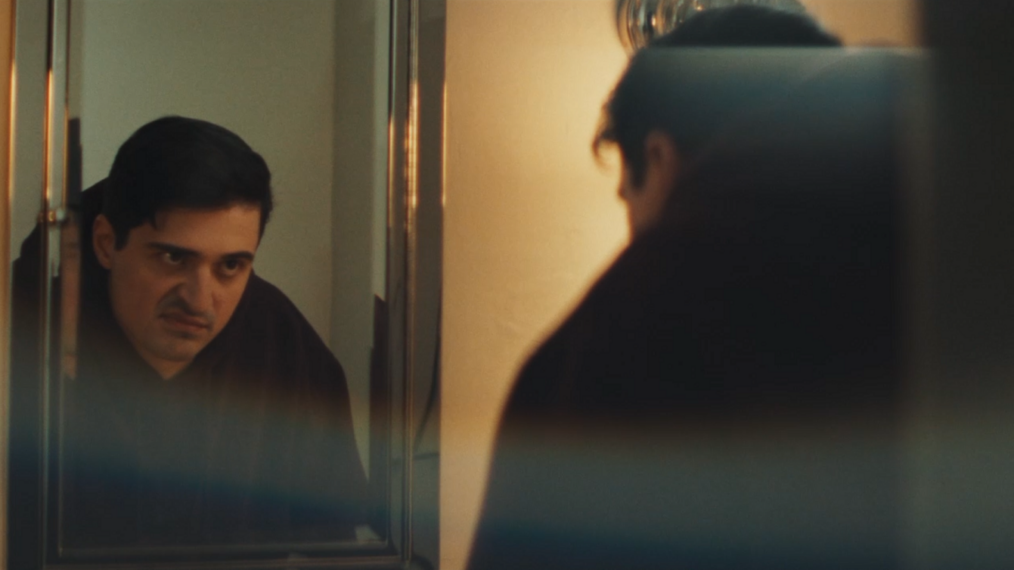
Q&A
Picture a dystopian time where one had to be chosen and deemed “worthy” in order to become a father. That’s what happens in Daddy, a part sci-fi, part dark comedy heading to VOD on April 15. Directed by Jono Sherman and Neal Kelley, the movie centers on four men Andrew (Kelley), Jeremy (Sherman), Sebastian (Yuriy Sardarov), and Mo (Pomme Koch) who enter a state-sanctioned retreat in remote California where they find themselves without any guide or “monitor” decision-maker or any instructions.
They are left to their own devices, forced to get to know one another while on this journey in hopes of their approval for fatherhood. As time goes on paranoia and panic set in with a mysterious guest Ally played by Jacqueline Toboni, which exacerbates things.
For Sardarov, it’s a bit of a departure from Brian “Otis” Zvonecek, the fan favorite Truck 81 driver on Chicago Fire for what would be eight seasons. Fans of the popular NBC staple alongside Firehouse 51 were rocked to find out in the Season 8 premiere “Otis” had died from injuries stemming from responding to a mattress factory fire. In a heroic act, he slammed a steel door shut to protect everyone from facing the backdraft from a boiler explosion.
Despite happening in 2019, viewers continue to mourn the shocking loss. We caught up with Sardarov to talk Daddy and reflect on his Chicago Fire exit more than five years later.
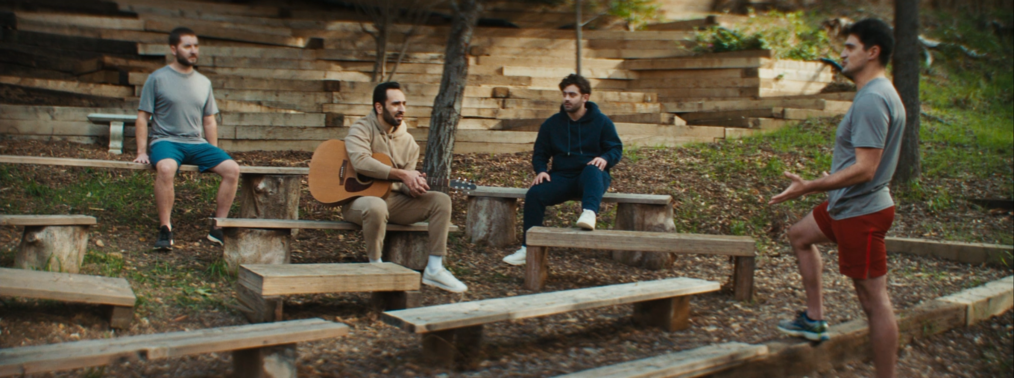
Andrew (Neal Kelley), Jeremy (Jono Sherman), Sebastian (Yuriy Sardarov), and Mo (Pomme Koch).
The premise for Daddy is quite the social experiment on many levels. What was your takeaway from reading the script for the first time?
Yuriy Sardarov: We worked on it for quite some time. I think I got the script right before COVID started, so we really had the opportunity to dive into this stuff. My first takeaway was how funny it was. I loved the guys I worked with. We went to college together. It kind of helped. This was like really extreme versions of one another. There was a dark comedy that made me laugh really hard.
Some of the potential symbolism and nuance was interesting to me like how you all wore different colored hoodies. I may have been reading a bit too much into that. There is a dance sequence that came off like you were a boy band.
Let me ask you. Did it symbolize anything for you in particular?
Maybe different emotions or the type of personalities? I could be reading more into this than intended.
Oh no! I love that. I hadn’t even thought of that. That’s great. The thing that sticks out to me about the movie and the thing I didn’t subtextually understand while we were doing it was these are four men who go to this place and get abandoned. Not only are you dealing with fatherhood, of course toxic masculinity, male friendships, but you are also dealing with how men deal with being abandoned. My character Sebastian, the anger he carries inside. The psychopathy that comes into it. Then you have Jeremy, who wants to work together to build a community. Like let’s start a farm and be best friends. Then you have Mo, who abandons us. You have Neal’s character who becomes the stoic. I kind of wish I recognized this when we were filming this. Some of this stuff is good to sub-textually understand, but it’s like how men react when they are abandoned.
Also, the question of what really qualifies someone to have someone judge them to be a father or not.
Totally. And why do they get to go to this posh retreat? Why do these guys get to go into the mountains? God only knows what the women are going through.
Then Jacquelne’s character comes into play. How was it having her in this story and even on this male-dominated set?
It’s funny you bring that up because that did change the dynamic. We filmed the latter portions of the film so we could come in grizzled and bearded. Then we started to film the movie chronologically, and then Jacqueline came in and completely changed the alchemy offscreen. Jacqueline is so prepared and so alpha, it really changed the chemistry of us as performers as well.
People know you so much as Otis from Chicago Fire. How do you compare Otis to stepping into this role of Sebastian?
The main difference with Otis is I think he had a positive outlet for his emotions. He gets to go to work and be a firefighter and save people’s lives. I think that within the themes of Daddy, the film, and I can only speak from the male perspective, but men need purpose. I have a whole backstory for Sebastian for what he does for work and how he treats people, but I think he is someone who is suffering without a real true purpose. I often think the purpose is in the service of people. Not in service of yourself. On one end, you have a guy who is very much in service to himself and on the other hand you have Otis, who is very much in service to people.
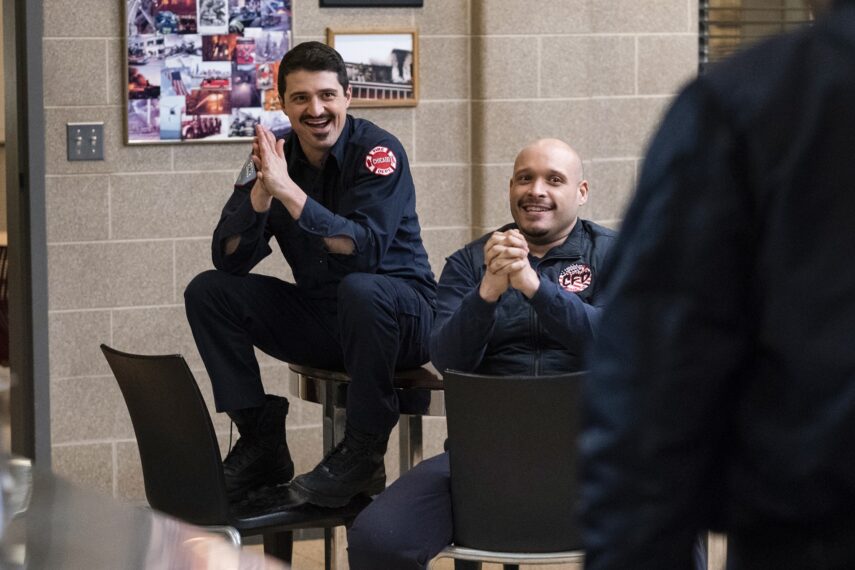
CHICAGO FIRE — “It Wasn’t About Hockey” Episode 714 — Pictured: (l-r) Yuri Sardarov as Brian “Otis” Zvonecek, Joe Minoso as Joe Cruz — (Photo by: Elizabeth Morris/NBCU Photo Bank/NBCUniversal via Getty Images via Getty Images)
Fans of Chicago Fire are still mourning your death. It was one of the most emotional send offs for a character in recent years. How do you look at it with today’s lens? When you get killed off and see the show continue on for many more seasons, how do you come to grips with all that?
I’ve known Derek Haas and Michael Brandt, who created the show in conjunction with [Dick] Wolf. I’d known them prior, and they were the ones who came to me with the opportunity to do the show. I was so grateful. It’s still the greatest thing to ever happen to me. The community, friendships we built. We are a family. Any time I’m in Chicago I see Joe [Miñoso]. I see Miranda [Rae Mayo].. I moved to where I moved to in LA because Monica Raymund let me stay at her house during COVID, and I fell in love with the area. We were a family. There came a point I told Derekc and said, “I think I’m ready to go.” It was my decision. I didn’t know how they were going to write me off.
There is such finality to death.
There is a finality to it. So, it was deeply emotional. In that scene where I’m dying and on my deathbed and [Joe] Cruz is next to me. The emotion I’m conjuring is very real because that was the last scene I shot. It’s difficult when you have purpose as a person. When you’re on a network television show and waking up every day at 5 a.m. when it’s -20. You’re outside with your brothers and sisters, carrying a ladder all day and sweating in your suit. Then suddenly to not have that, it’s a real shock to the system. It has taken me some time if I’m being honest to figure out what’s next for me. I do think for all of us not to become Sebastian’s, sometimes we have to take the hard road and walk away from the thing that is giving us pleasure and humble ourselves a little bit here and there.
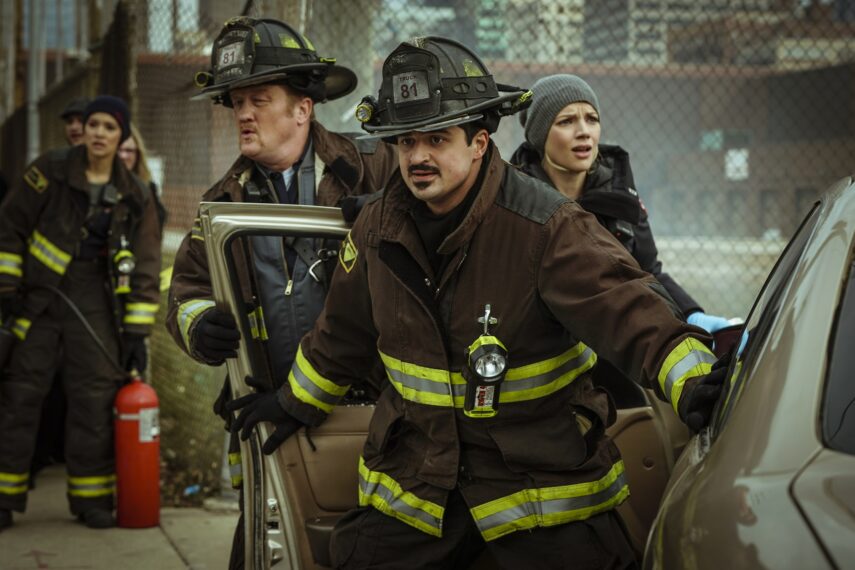
CHICAGO FIRE — “The F is For” Episode 612 — Pictured: (l-r) Christian Stolte as Mouch, Yuri Sardarov as Otis, Kara Killmer as Sylvie Brett — (Photo by: Elizabeth Morris/NBCU Photo Bank/NBCUniversal via Getty Images via Getty Images)
Derek said in an interview that there was discussion about [Darren] Ritter at one point being the one that died, but he was still new to the show.
I was on the show for seven, going on eight seasons. So, you get people coming in and out all the time. Daniel [Kyri] was one of the few where when you meet him, and you think, you’re one of us. I think he kind of proved it over time. I’m not entirely sure what Daniel’s deal was, but I know for me Season 1, I was recurring. I wasn’t a series regular. So, you really have to prove yourself. I think Daniel really did that. He is a Chicago guy. He is a theater actor, true artist. I think it would had been sad to lose him so soon. I do think the shocking death of someone like Otis impacts an audience greatly.
Are you still watching the show now?
Yeah, any time it’s on and I catch it. I’ll catch reruns of episodes and think, “I totally forgot filming that.” I did 170 episodes. I think, “That storyline. That’s crazy.” I watch it, and it’s a good show. It’s hard to really understand it when you’re in it. I watch it now, and we really did something.
What do you miss most about playing Otis?
I miss the days where it’s me, David [Eigenberg], [Christian] Stolte, Joe and I…Mouch, Cruz and Hermann are sitting around at the coffee table and we all have food in front of us and coffees. And it’s just like four pals talking nonsense. That’s the stuff I miss most. That was the thing that I overlooked while I was doing the show.
Whether it’s the bond with Cruz, cancer scares, relationships, firefighting scenes, any part of the character that will always stand out the most?
The stuff that was hardest to film. The firefighting stuff. The real heroics of it. On those shoot days, it’s brutal. You’re in gear, masked up. That’s the stuff I actually miss most. The saving people because when it comes out on camera, it looks amazing. I also really loved the Kelly [Severide] sister storyline we had going on. I thought that was really cool. The mystery and detective aura of it all. I loved that storyline.
When it comes to Daddy, what do you want to tell people about what they’re about to watch leading into the end of the film?
Can I ask you how it makes you feel?
I was a little frustrated. I’m not going to lie.
I wasn’t entirely part of the creative process, but I think that is part of it. I think the creators want people to walk away with a certain level of frustration because as we’re seeing now with the current climate of the world, these are enduring things. Men, angry men, causing trouble. I think the frustration is enduring and unfortunately timeless. My hope is at least people ask themselves, “What would I do if I was stuck in a retreat like that? How would I act?” I hope they are honest with themselves.
What do you want to let people know that you’re up to these days beyond this movie?
I’m currently writing. I’m hoping to direct a feature, hopefully in the next year, maybe two. I’m also teaching. I started teaching acting. It’s something that has been so invigorating to teach people some of the stuff I was so fortunate to learn. That has really helped me fall in love with the craft again after COVID, the fires, the strikes, so much has happened in Los Angeles to keep us from doing what we love. To be able to feel that again, has been really inspiring.
Daddy, April 15, streaming on VOD
Chicago Fire, Wednesdays, 9/8c, NBC

